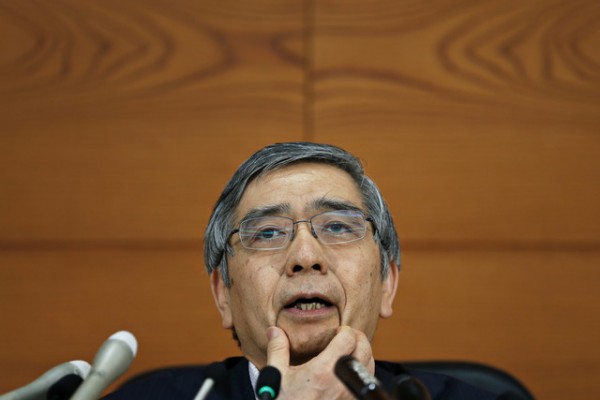
Bank of Japan Haruhiko Kuroda (Kiyoshi Ota/Bloomberg)
The Bank of Japan, the country’s central bank governed by Haruhiko Kuroda, said the economy is showing signs of recovery after three months of inflationary policies, according to a New York Times article. The statement released Thursday was the first time the central bank has used the word “recovery” since the March 2011 quake/tsunami/nuclear crisis.
The bank’s stated goal is to increase inflation by two percent and to pump 60 trillion to 70 trillion yen ($600 billion to $700 billion) annually into the economy. This policy is popularly known as “Abenomics,” named after current Prime Minister Shinzo Abe.
I have mixed feelings on raising consumer prices in Japan. On one hand, inflation encourages consumer spending (people are more likely to spend money if they perceive prices will be higher in the future), which stimulates the economy, on the other hand, consumer prices are already sky-high in Japan. There also seems to be apprehension that wages won’t be able to keep pace with two percent inflation. At a New Year’s party I attended in January in Lenexa, Kan., a suburb of Kansas City, Masaharu Yoshida, consul general of Japan in Chicago, half-jokingly said while he gets a one percent raise each year, the government’s stated goal is two percent inflation, so really he’ll be taking a one percent pay cut each year. (He also lamented his salary was based on the yen, not the dollar, even though he was currently posted in the U.S., at a time when the yen was finally weakening against the dollar.) Consumers would be wise to take a qualitative, rather than quantitative, appraisal of their salaries.
Consumer prices in Japan are ridiculously expensive due partly to collusion between corporations and regulators and largely to a highly inefficient distribution system. At this risk of agreeing with much-loathed former Tokyo governor Shintaro Ishihara, this is a topic he dedicated an entire chapter to in his controversial 1989/1991 book, The Japan That Can Say No. I personally agree with Ishihara that Japan should focus on deregulation and streamlining distribution to drive prices down and become more competitive. A cynic (such as myself) might think Japanese politicians prefer prices remain high so workers will save more money in their post office savings accounts, which sticky-fingered politicians treat as their own slush fund.
On another note, while campaigning in Iwaki, Fukushima, earlier this month, PM Abe said the reason he is healthy is because he eats Fukushima-grown rice every day, according to Merx, a Japanese news blog.
Many Japanese consumers are wary of Fukushima-grown produce ever since the March 11, 2011, tsunami-triggered meltdown at the Fukushima Dai-ichi nuclear power plant. I agree with Abe’s motive to show solidarity with the residents (voters) of the affected areas, but his statement sounds like blatant propaganda to me, beyond just mere pandering. Of course most Japanese people can see through Abe’s comment. Upon hearing Abe’s words, my wife, who is Japanese (forgive the presumption my wife speaks for all Japanese people), laughed and said, “Who would believe that?”
Abe’s ruling Liberal Democratic Party is expected to win in a landslide in July 21’s election.